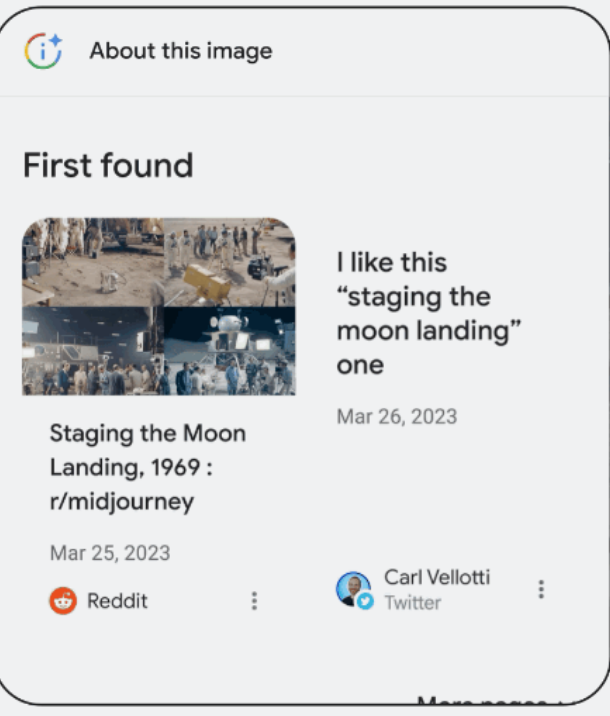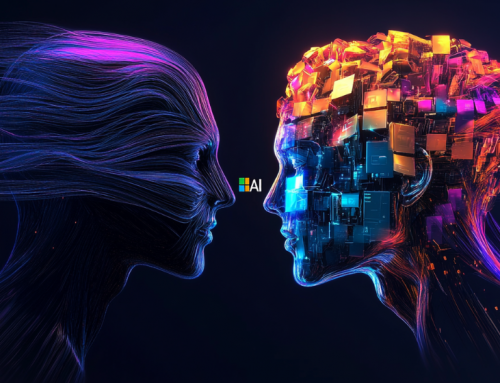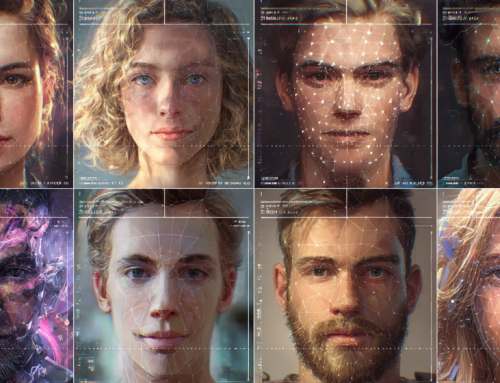
Google hopes to get generative AI companies like Midjourney and Stable Diffusion to partner with their efforts to fight against ‘deepfakes’ or AI-generated photorealistic images.
Google I/O Covers Deepfakes, Announces AI Search Overhaul
Google I/O 2023, its developers’ conference, trumpeted an array of new releases, as well as numerous AI announcements to demonstrate how it has become a serious player in the field.
There was a new large language model, AI features in Docs and Sheets, and generative features in Android. And Google demoed a major overhaul to Google Search that puts generative results front and center. The company also announced a wave of new Pixel devices, including the Pixel Fold, Pixel Tablet, and Pixel 7A.
It looks like the panic at the executive headquarters last fall led to an extended burst of productivity.
Taking On Deepfakes
Google also announced three new features designed to help people spot AI-generated fake images in search results, reports Bloomberg. From a piece on arstechnica.com, we learned what Google has in mind to try and complete with the OpenAI/Microsoft/Bing chatbot called ChatGPT.
Regarding deepfakes, we all know they have been around for a while, But the new generative AI programs have taken deepfakes to an entirely new level. Thanks to AI image synthesis models like Midjourney and Stable Diffusion, it has become trivial to create massive quantities of photorealistic fakes, and that may affect not only misinformation and political propaganda but also our conception of the historical record as large amounts of fake media artifacts enter circulation.
For example, take a look at the Ronald Reagan image that was created recently with Midjourney. It is the altering of historic images and moments in time that has some people very concerned about keeping the truth straight for students and the public in general.

Photorealistic AI-generated images like this one of Ronald Reagan, who only served in the motion picture unit of the military from 1942-45, may distort our sense of history. Google wants to fix that. (Source: Midjourney)
In an attempt to counteract some of these trends, the search giant will introduce new features to its image search product “in coming months,”according to Google.
About This Image
The first feature, “About this image,” will allow users to click three dots on an image in Google Images results, search with an image or screenshot in Google Lens, or swipe up in the Google app to discover more about an image’s history, including when the image (or similar images) was first indexed by Google, where the image may have first appeared, and where else the image has been seen online (i.e., news, social, or fact-checking sites).
Google says it will have a right-clicking version as well as long image pressing ready in a few months for Chrome.
Digital Watermark
The next feature Google is promoting is putting a label on all the mages its own AI produces. A digital watermark with Google I.D. if you will. Google plans to label all images generated by its AI tools with special “markup,” or metadata, stored in each file that clearly indicates its AI origins.
Cooperation Sought
Google says it is also collaborating with other platforms and services to encourage them to add similar labels to their AI-generated images. Midjourney and Shutterstock have signed on to the initiative; each will embed metadata in their AI-generated images that Google Image Search will read and display to users within search results.
Some people think this is hardly enough considering what is at risk with generative AI and its ability to alter perceived realities of history. The article uses the ‘moon landing’ as an example of AI being asked to blur the lines between real and fake.
And while the efforts Google is putting forward are an important step in controlling this surge of AI-driven content in nearly all of today’s media sources, many feel it still is not enough to avoid serious consequences for the uninformed or misinformed.
But at least Google is willing to admit there are issues with some of its best-selling AI tools and is taking at least some steps to correct them. A quote from a Google executive:
Sixty-two percent of people believe they come across misinformation daily or weekly, according to a 2022 Poynter study. That’s why we continue to build easy-to-use tools and features on Google Search to help you spot misinformation online, quickly evaluate content, and better understand the context of what you’re seeing. But we also know that it’s equally important to evaluate visual content that you come across.
The article was written by Benj Edwards and he has included several links to explain some of what Google has in mind now that Microsoft has ChatGPT to challenge Google for search engine supremacy. Stay tuned as this competition is starting to get pretty heated.
read more at arstechnica.com







Leave A Comment